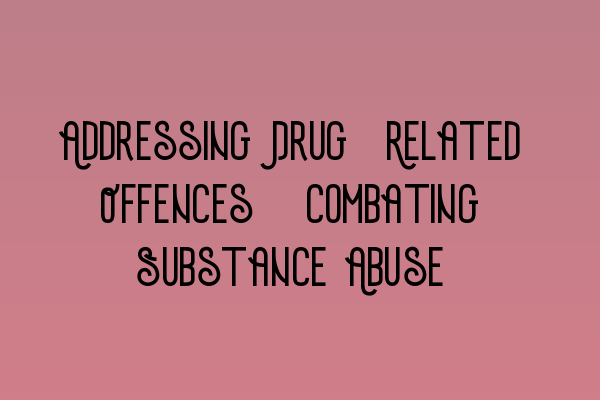Addressing Drug-Related Offences: Combating Substance Abuse
Drug-related offences have become a serious concern in our society, posing significant challenges to law enforcement agencies, healthcare providers, and communities as a whole. In order to effectively combat substance abuse, it is crucial to understand the underlying causes, develop prevention strategies, and ensure appropriate legal measures are in place.
Understanding the Root Causes of Substance Abuse
Before we delve into addressing drug-related offences, it is important to acknowledge the factors contributing to substance abuse. Numerous studies have highlighted a range of factors, including social, economic, and psychological influences, that can lead individuals down the path of drug addiction.
One key approach to addressing substance abuse is through prevention efforts. By focusing on early intervention, education, and support services, we can equip individuals with the knowledge and tools necessary to make informed decisions and avoid falling into the trap of addiction.
The Role of Law Enforcement in Combating Drug-Related Offences
Law enforcement agencies play a crucial role in combatting drug-related offences. They are responsible for investigating and apprehending drug dealers and traffickers, disrupting the supply chain, and dismantling organized crime networks involved in the drug trade.
In order to effectively combat drug-related offences, it is essential for law enforcement agencies to work in collaboration with other stakeholders, such as healthcare professionals, addiction treatment centers, and community organizations. This multidisciplinary approach ensures that individuals involved in substance abuse are not only apprehended and prosecuted but also provided with the necessary support and rehabilitation services to break the cycle of addiction.
Implementing Effective Legal Measures
Addressing drug-related offences requires the implementation of effective legal measures that not only deter individuals from engaging in illegal drug activities but also provide opportunities for rehabilitation and reintegration into society.
Legislation should focus on striking a balance between punishing drug offenders and offering them a chance for redemption. Diversion programs, drug courts, and alternative sentencing options can offer individuals facing drug-related charges an opportunity to receive treatment and rehabilitation, reducing the likelihood of recidivism.
It is important for legal professionals, such as solicitors, to stay up to date with the evolving laws and regulations surrounding drug-related offences. Ongoing professional development and specialized training, such as the SQE 1 and SQE 2 preparation courses offered by SQE Criminal Law & Practice Law UK, are essential for providing the best representation and guidance to clients involved in drug-related cases.
Conclusion: Working Towards a Drug-Free Society
In conclusion, addressing drug-related offences and combating substance abuse requires a comprehensive and collaborative approach. By understanding the root causes of substance abuse, involving law enforcement agencies, implementing effective legal measures, and providing support for rehabilitation, we can work towards a drug-free society.
To further enhance your knowledge and preparation for SQE exams, check out these related articles:
- SQE 1 Practice Exam Questions
- SQE 1 Practice Mocks FLK1 FLK2
- SQE 2 Preparation Courses
- SQE 1 Preparation Courses
- SRA SQE Exam Dates
